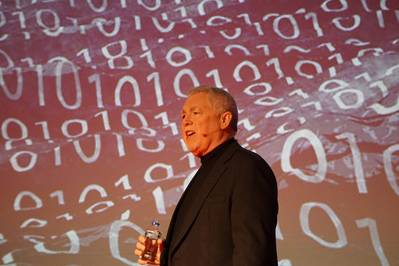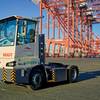Shipping Needs an Attitude Adjustment -Transas Chief
Speaking last week at the 2018 Transas Global Conference in Vancouver, Transas CEO Frank Coles laid out his vision for the maritime industry’s future – from safer, greener and more efficient ships to a world without freight forwarders.
As has come to be expected from the Transas CEO, Coles did not hesitate to offer a healthy dose of constructive criticism – particularly in the direction of those he sees as a hindrance to industry-wide progress, be it ship owners and operators, freight forwarders or regulators.
“If Elon Musk was to attend a plenary session of the IMO, he could be forgiven if he thought he was watching a reenactment of the Charles Dickens book Hard Times,” Coles said to begin his keynote address. “That’s quite a sad reflection of our industry.”
As Coles outlined the maritime sector’s various economic, technological and environmental challenges, a key theme was that the industry often stands in the way of its own progress to impede the disruption that the Transas chief sees as not only beneficial but absolutely necessary.
“Maritime operations and its infrastructure seem to be changing at a snail’s pace. We seem to be content to have old-fashioned ships and old-fashioned business infrastructure sitting alongside modern logistics,” Coles said. “There’s been some progress, but it hasn’t been enough, and does not go fast enough.”
Coles identified industries such as aviation, nuclear power and space as working at a higher level of quality when compared to maritime. While these industries require a “strict culture of excellence” and have developed a “deep awareness of their own vulnerabilities,” Coles argues that maritime is often stuck in an “out-of-date business-style” with “multiple stakeholders all vying for an opinion and ultimately producing a messy result.” Coles called it ASS, an acronym for “archaic spaghetti structure.”
“We have reached a frankly ridiculous point. Where a lobby of suppliers, owners and thinktanks creates a bureaucrat’s solution in committee. That can take years to come to any conclusion. This is not going to work in the new world. We cannot keep designing a donkey when we are looking for a racehorse,” Coles said.
“Companies in maritime operations need to up their game and move to the same high standards as other transport modes, where an incident can lead to a loss of life or an ecological disaster.”
“When it comes to safety, the maritime sector does not operate to the level of excellence that the average person would expect of a global industry in the 21st century,” Coles said. “The sector’s establishment works in the complete opposite direction. The consensus-driven committee structure of its global regulator results in 'lowest common denominator' rulemaking.”
“The attitude seems to be ‘What is the least we can get away with?’. This is at odds with the aim of saving lives and property. Furthermore, it is at out of sync with a world that is becoming increasingly transparent, where anyone with a smartphone can become a whistleblower, where bad practices can no longer be covered up as easily as they once were.”
“Until we change the attitudes to the business and the current maritime culture, technology remains just a patch, not a solution.”
Coles acknowledged the growing use of connectivity and use of monitoring and of data for analytics and performance but said these remain fragmented as an appreciation of facts behind digitalization and the cybersecurity of ship operations is largely absent from the industry.
Coles’ company Transas has developed an ecosystem of integrated solutions for ship safety, navigation and operations. The harmonized approach, Coles believes, is the best way forward. “We need to build ships with integrated systems of systems, not a mishmash of standalone IoT applications,” he said.
Coles used another acronym, FOSSIL, or “fleet operations solutions stuck in limbo”, to describe the business of maritime operations and ships and ship operations working in “dark dungeons compared to the shipping logistics model.”
“We layer modern technology on top of old-fashioned business processes. The old-fashioned structures of regulators, clubs, lobbies and representative bodies no longer fit with the new world. Nor do they move fast enough to keep up.
“Attitude lies at the heart of our inability to change. We have a real problem with how we regulate the industry,” Coles said.
“In maritime, change mainly seems to be coming from engine manufacturers and the use of alternative fuels and more efficient engines,” Coles said. “Of course this progress is important, especially for our oceans, but also for the efficiency of ships.”
Coles said many have forgotten the fundamental issue: “the human factor”.
“There is another major reason change is necessary. The next generation are simply not going to put up with such an archaic business or tolerate its structures,” Coles said. “This new connected generation will not accept the lack of safety. Nor will they accept a lack of respect for the environment or the lack of sensible inter-connected ecosystems.”
“Technology is an enabler: it provides decision support; it reduces workload; it provides analytics to enable smarter operations; and it removes the drudgery.”
“All this only happens in a correctly-prepared environment. In the hands of an untrained user and, in a structure that does not remove the older processes when new technology is introduced, it has the opposite effect. It increases risk and reduces safety.”
“The tools are in place, there is an ability to share decisions, information and monitor data across multiple stakeholders, but it is not being done.”
“We need to move towards an ecosystem in maritime safety and operations not unlike that of aviation. We need to separate the cargo elements, port operations from the safety of navigation elements, Coles said. “Maritime needs an integrated operations ecosystem for the safe navigation of tomorrow’s ships.”
“We also need to factor into this the human element at a level where it is properly trained, properly equipped and structured in a modern way to fit the model. If not, the maritime industry will slip further away from the realities of the modern world, the needs of the next generation and the demands of the new shippers.”
“The disruption has begun. We just need to remove the final roadblocks. As the dinosaurs are eclipsed the new dawn will take shape.”
Read Coles' full remarks here, or watch the keynote address here.














